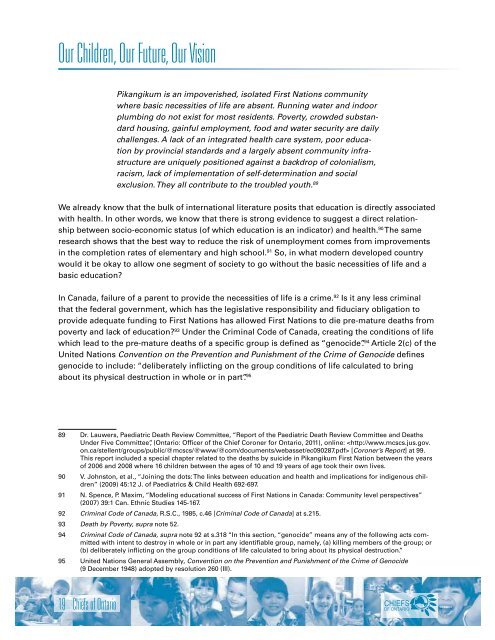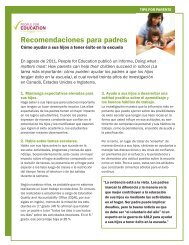Our Children Our Future Our Vision - People for Education
Our Children Our Future Our Vision - People for Education
Our Children Our Future Our Vision - People for Education
You also want an ePaper? Increase the reach of your titles
YUMPU automatically turns print PDFs into web optimized ePapers that Google loves.
<strong>Our</strong> <strong>Children</strong>, <strong>Our</strong> <strong>Future</strong>, <strong>Our</strong> <strong>Vision</strong><br />
Pikangikum is an impoverished, isolated First Nations community<br />
where basic necessities of life are absent. Running water and indoor<br />
plumbing do not exist <strong>for</strong> most residents. Poverty, crowded substandard<br />
housing, gainful employment, food and water security are daily<br />
challenges. A lack of an integrated health care system, poor education<br />
by provincial standards and a largely absent community infrastructure<br />
are uniquely positioned against a backdrop of colonialism,<br />
racism, lack of implementation of self-determination and social<br />
exclusion. They all contribute to the troubled youth. 89<br />
We already know that the bulk of international literature posits that education is directly associated<br />
with health. In other words, we know that there is strong evidence to suggest a direct relationship<br />
between socio-economic status (of which education is an indicator) and health. 90 The same<br />
research shows that the best way to reduce the risk of unemployment comes from improvements<br />
in the completion rates of elementary and high school. 91 So, in what modern developed country<br />
would it be okay to allow one segment of society to go without the basic necessities of life and a<br />
basic education?<br />
In Canada, failure of a parent to provide the necessities of life is a crime. 92 Is it any less criminal<br />
that the federal government, which has the legislative responsibility and fiduciary obligation to<br />
provide adequate funding to First Nations has allowed First Nations to die pre-mature deaths from<br />
poverty and lack of education? 93 Under the Criminal Code of Canada, creating the conditions of life<br />
which lead to the pre-mature deaths of a specific group is defined as “genocide”. 94 Article 2(c) of the<br />
United Nations Convention on the Prevention and Punishment of the Crime of Genocide defines<br />
genocide to include: “deliberately inflicting on the group conditions of life calculated to bring<br />
about its physical destruction in whole or in part”. 95<br />
89 Dr. Lauwers, Paediatric Death Review Committee, “Report of the Paediatric Death Review Committee and Deaths<br />
Under Five Committee”, (Ontario: Officer of the Chief Coroner <strong>for</strong> Ontario, 2011), online: [Coroner’s Report] at 99.<br />
This report included a special chapter related to the deaths by suicide in Pikangikum First Nation between the years<br />
of 2006 and 2008 where 16 children between the ages of 10 and 19 years of age took their own lives.<br />
90 V. Johnston, et al., “Joining the dots: The links between education and health and implications <strong>for</strong> indigenous children”<br />
(2009) 45:12 J. of Paediatrics & Child Health 692-697.<br />
91 N. Spence, P. Maxim, “Modeling educational success of First Nations in Canada: Community level perspectives”<br />
(2007) 39:1 Can. Ethnic Studies 145-167.<br />
92 Criminal Code of Canada, R.S.C., 1985, c.46 [Criminal Code of Canada] at s.215.<br />
93 Death by Poverty, supra note 52.<br />
94 Criminal Code of Canada, supra note 92 at s.318 “In this section, “genocide” means any of the following acts committed<br />
with intent to destroy in whole or in part any identifiable group, namely, (a) killing members of the group; or<br />
(b) deliberately inflicting on the group conditions of life calculated to bring about its physical destruction.”<br />
95 United Nations General Assembly, Convention on the Prevention and Punishment of the Crime of Genocide<br />
(9 December 1948) adopted by resolution 260 (III).<br />
19 Chiefs of Ontario
















